Former Essendon coach James Hird opens up on his mental health demons and how he will use his recovery to help others
James Hird reveals to his good mate Shane Crawford the mental health battles he endured during and after the Essendon sports supplements scandal. Now that he’s overcome those demons, he wants to help others.
AFL News
Don't miss out on the headlines from AFL News. Followed categories will be added to My News.
James Hird has revealed how his mental health battles left him at times feeling like he was trapped "at the bottom of a 30-foot well" seemingly with no way out.
But in a revealing interview with fellow Brownlow medallist and close friend Shane Crawford, the Essendon great hopes his road to recovery can assist others suffering through similar issues, especially during the coronavirus pandemic.
Hird detailed the toll that the Bombers' 2013 sports supplements saga took on his life and on his family across a seven-year period, including a moment where he sat inconsolable in a parked car in Sandringham before a call to Beyond Blue helped save him.
“No matter how bad things get, there is a way through it," Hird said.
“It doesn't happen quickly or easily, but life can be great if you can get through it. It helps to have the support of your family and your loved ones. I was very lucky in my case, with my wife Tania and with my kids.
Get your footy fix on KAYO ahead of live matches returning soon. Watch classic battles from the 60s to today, docos, news and more. New to Kayo? Get your 14-day free trial & start streaming instantly >
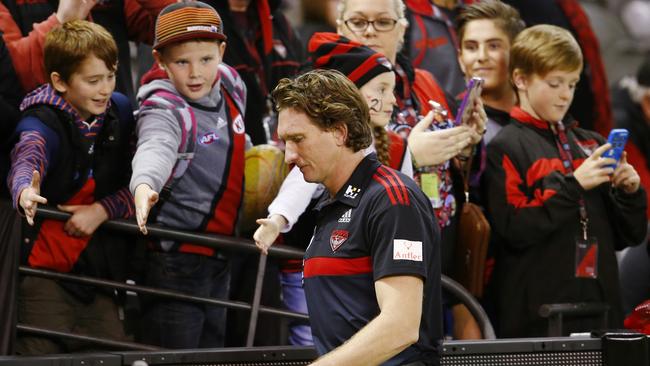
“Without Tania, and her love and support, I don’t think I would still be here.
“This is a seven-year journey to get to the point that I'm happy to talk about it (with Crawford), but I'm also happy that I feel as good as ever, having my life back.”
In the hour-long chat for AIA Vitality, where Crawford is an ambassador, Hird also explained how he:
FELT he had brought shame to his family, the club and the game he loves, even though he maintained the Essendon players were innocent of the drug charges;
FAILED to look after his own personal wellbeing in a quest to protect the players;
RAN away overseas for a period because he couldn't deal with what had happened;
SPENT five weeks battling depression in a psychiatric facility when his issues came to a head in early 2017.
'IT WASN'T ABOUT ME OR FOOTBALL'
One of his most poignant moments came when he called Beyond Blue in late 2015, months after losing the Essendon coaching role.
“I was sitting in the car and had some shocking thoughts about what was next,” Hird told Crawford.
“Fortunately, I remembered Beyond Blue was the number the club had always talked about.
“I pressed the number. Within 30 seconds a guy was on the other end of the phone.
“I said, 'Mate, this is how I feel. I feel like I can't go on. I've brought shame to my family, shame on my football club and my profession. I've lost my identity’.
“He said, 'Where do you live?'
“I said, "I live about 15 or 20 minutes from here.
“He said, "You think you can drive yourself home? I'll talk to you, but just drive home'.
“I started the car and was talking to him. By the time I got home, there's a special unit from the Alfred Hospital waiting outside my front door.
“He didn't know my name. It wasn't about me or football.
“This was the end of 2015, but then I ran again and ended up overseas for quite a long time.”
The feeling of never being able to escape the controversy weighed on him heavily.
“I think back to time in 2015 and 2016 where I felt like I'm at the bottom of a 30-foot well,” he said.
“It's dark and every time I try to climb out of that well, another brick just hits you on the head and people are just throwing bricks at your head or you're throwing them at your own head.
“To be helpless like that, lying in bed and hearing your kids playing outside but still not being able to move.
“To where I am now … it is just light years away. The sense of happiness and joy you get from understanding how you feel now (compared) to how you felt so poorly, is a really nice feeling. Yeah, there's up and downs … but I have a much greater appreciation for how good you can feel after knowing how bad you can feel.”
'CRYING ON THE KITCHEN FLOOR'
If any AFL footballer contemplating retirement had a reason to expect a smooth transition to post-footy life, it appeared to be Hird.
But when he called it quits at the end of 2007 after 253 games, two premierships, a Brownlow Medal and a Norm Smith Medal, he couldn't have contemplated the impact it would have on his state of mind.
“I thought I would transition out of footy and into this business (he had helped set up) and I wasn't going to miss it,” he said.
“(But) I remember sitting on my kitchen floor and everyone's gone to bed, my wife's upstairs, the kids are in bed, and I am sitting there, just crying on the ground.
“You're just grieving (for) this life you had.
“As much as I was glad to retire because I'm sick of being sore … there was this grieving process.”
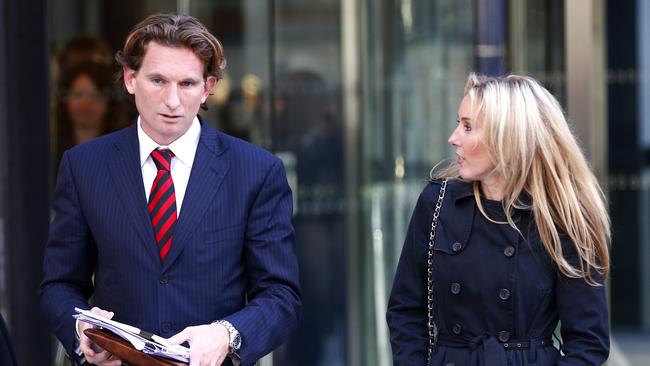
'HISTORY WOULD SAY IT WAS A POOR DECISION'
For a person whose preparation had always been first rate, Hird conceded in hindsight a coaching apprenticeship might have provided a better platform.
He was drawn back to Essendon in late 2010 – as senior coach – to help the club, but he was also missing footy.
“History would say it was a poor decision, but I really missed football at the time,” he said of his elevation to the coaching job.
“(I) naively thought you could jump straight out of playing into coaching, which I think in hindsight was a mistake.
“It was a really tough decision for a number of reasons. I knew it was going to be challenging for our family just because coaching is tough.”
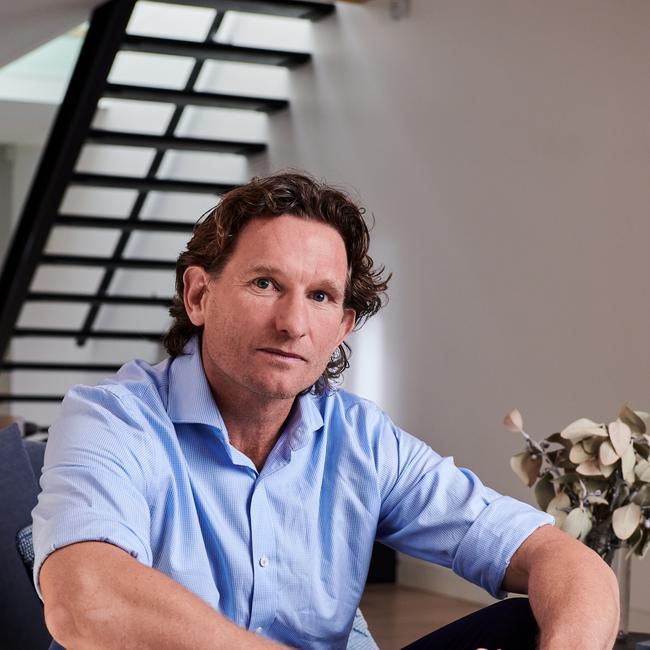
'WE DEFINITELY HAVEN'T BEEN DOING IT'
Hird thought life couldn't get much better when he went for a run on the morning of his 40th birthday – February 4, 2013.
By the end of the day, it couldn't have appeared much worse.
“I woke up in the morning, went for a run and literally had the thought 'I've just had a great life'. I played for the club I wanted to play at, (had) been successful, got a job I wanted, married the most perfect woman in the world and had four kids.
“Life doesn't get much better. That was maybe seven o'clock in the morning.
“By two o'clock in the afternoon … the president (David Evans) came into my office and basically said: 'The AFL thinks we're guilty of giving the players performance enhancing drugs, what do you think?'. I'm like, 'What do you mean, 'what do I think?' We definitely haven't been doing it. I don't know what you're talking about?'
“Then it just snowballed from there”.
That snowball turned into the biggest avalanche in AFL history, with the ASADA investigation centred on whether one-time club employee Stephen Dank had administered illegal substances to players in 2012.
“We set off a train that basically ended up with the players being found not guilty initially, (then) suspended for a year in 2016.
“Literally, it was far and away the worst time in my life, but by far and away the worst time – more importantly – in 34 players' lives and a lot of good people in football.”
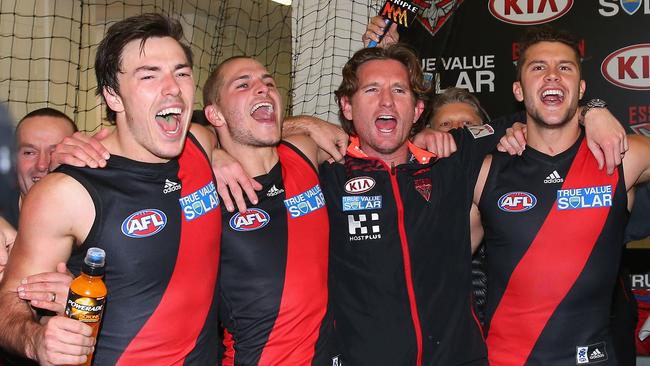
"(I) SHOULD'VE PUT A STOP TO IT EARLIER'
Hird maintains the club and its players were innocent of the charges.
But he concedes he was too trusting.
“It wasn't my responsibility. You have the medical staff, you let them do their thing, but I probably should have known what was going on earlier, and should have put a stop to it earlier.
“I'm very, very disappointed that I didn't, because if I had, perhaps what happened wouldn't have happened, but you learn, right? I wish that hadn't happened because a lot (of people), particularly 34 players and their families, got terribly hurt through it all.
“I suppose my family's probably been hurt as much as anyone's family.
“I just feel for the players who, totally innocent, have had … three or four years of their careers (impacted).”
Hird said the club “got rid of a couple of people that we didn't want there”, but the damage the players and coaches suffered can never be measured.
SUBSCRIBE TO THE HERALD SUN FOOTY PODCAST HERE
'DAD, YOU'RE GOING TO HAVE A BAD DAY'
Hird used to judge how his day would likely unfold by the number of media outside his home each morning.
“On a good day, you would have 10; on a bad day you'd have 50 out the front," he said.
“It came to a point midway through (2013) where … the kids would stand at the glass window and they'd basically say to me: 'Dad, you're going to have a good day' or 'You're going to have a bad day'.
“They (the kids) were right in the middle of it. The boys got a few punches thrown at the supermarket and a lot of abuse.
“I really felt for my wife because she was trying to hold our family together. She's a very proud person and also very defensive of me because she obviously saw me going through a lot.
“Every day you wake up and go 'all right, I've got to deal with this. I've got to work through it and one day this will finish’.
“And fortunately it did.”
After almost being sacked in 2013, missing 2014 due to a one-year ban, then returning to coach the following year, he finally parted ways with the club after a 112-point loss to Adelaide in Round 20, 1995.
His coaching career was over; the pain wasn't.
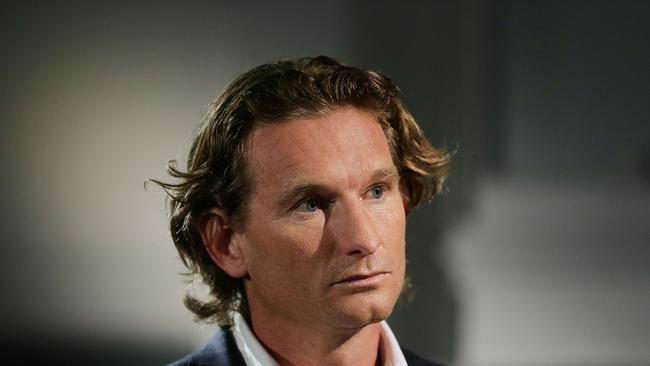
'IT'S NOWHERE NEAR AS BAD AS YOU THINK'
It took a lot of work and plenty of personal and professional support, but Hird is a far better place now.
That he made it through to the other side is a testament to his determination and to the support of those around him.
Now, he's on another mission – he wants to help others get through to the other side.
He says mental health has never been as relevant, given how COVID-19 has swiftly changed the world.
“Depression means a lot of things to a lot of different people,” he said.
“I can say I've been in a depressive cycle, which means I've been right down the bottom.
“Mental health in society is a huge issue. I think part of my story might be relevant to other people. Everyone has their own different story and if people want to listen to mine, if they can get something out of it, that's great.”
MORE AFL NEWS
North Melbourne coach Rhyce Shaw doubles down on comments about Round 2 plane companions Essendon
Preview of every Round 2 match-up
He said it was important for people feeling isolated to not feel as if they have to be perfect.
“When your relationships with people you care for are tested, when you don't get the job you wanted, or you want to earn more, (you have to realise) it's nowhere near as bad as what (you think) it was,” he said.
“It's OK if you slip off (routine) sometimes, so long as you get back on. Just take little pieces every day, in exercise, in diet, in health, in mental wellbeing, that's the way to start and you never know where you can end up.
“Life's not perfect. You are on this journey and it's up and down. When you realise that, I think you become a lot happier.”
Hird knows his journey will likely have more twists and turns, but is happier than he has been for a long time.
“The world is crazy at the moment as we all know,” he said.
“But just to spend some quality time with your family and your kids … treasure those times.
"Life is good.”
SEE the full Hird-Crawford interview at the AIA Vitality Onelife website
